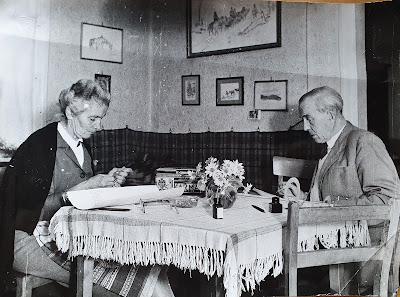I remembered this poem when I posted on a Facebook thread about vintage scents. I love them, and have a small collection. The better the scent, the longer it lasts. You can sometimes find bargains on eBay, and these old perfumes last a long time. I have a very old (and very large) bottle of Mitsouko, that still smells wonderful, given a little while to settle on the skin, My favourite, though, is Guerlain's l'Heure Bleue.
I wrote this poem years ago, published it in an anthology, and put it on an old blog too, but when I went in search of it online it had disappeared. So here it is again.
THE SCENT OF BLUE
A
concert in Edinburgh, years ago.
She
manages to find a single seat,
sees
a famous conductor,
silver
haired, sharp featured like some
bird
of prey, but smaller than you would
expect
in evening dress.
On
his arm a thin woman,
taller
than he is, strides with
striking
face, her hair a cloud of
grey
blonde curls.
Not
a young woman but a
diva
surely, inhabiting her clothes,
inhabiting
her skin with such confidence.
She
wants to be like that some day,
longs
for self possession
and
she remembers the scent of her,
musky,
mysterious, a heavy, night time
scent,
flowers after dark.
The
scent of passion.
The
scent of money.
The
scent of blue.
She
searches for the scent for years.
Her
mother wore Tweed.
Now
she wishes she could
open
a wardrobe door, and
smell
the scent of Tweed, her
mother’s
plain sweet scent,
almost
as much as she
wishes
she could tell her mother so.
As
a girl, she wore Bluebell,
fresh
and full of hope, or
Diorissimo,
like the lilac she once
carried
through the streets,
on
her way from meeting a man
she
desired and admired, thinking
Girl
with Lilac, still so young,
self
conscious, not possessed.
Later,
she tries l’Air du Temps and
Je
Reviens (always unlucky for her)
and
Fleurs de Rocaille but they are
none
of them the scent of blue.
She
wears Chanel, briefly, with dreams of Marilyn,
loves
to watch her, loves to hear her voice,
soothing
as chocolate but
Number
Five is not her scent,
never
suits her, never will.
She
discovers Mitsouko.
Some
tester in some chemist’s shop somewhere.
An
old, old fashioned scent,
syncopated,
unexpected, not to every taste.
Whenever
she wears it,
women
ask her what it is,
I
love your scent they say.
How
strange the way scent lingers in the mind.
How
strange the way scent
changes
on warm skin.
On
her it ripens to something peachy,
mossy,
rich and rare.
But
it is not the scent of blue.
She
loses her heart.
It
is an affair of telephone lines
more
profound, more sweet and
bitter
than Mitsouko,
a
sad song in the dark,
and
the colour of that time is blue.
Afterwards,
she searches through
Bellodgia,
Apres L’Ondee,
Nuit
de Noel, Mon Peche, Apercu
until
drawn by nostalgia
she
finds Joy,
dearly
bought roses and jasmine,
a
summer garden in one small bottle.
She
marries in Joy.
But
she wears Mitsouko
and
she forgets the scent of blue.
Older,
she discovers Arpege,
Not
just rose and jasmine but
bergamot,
neroli, peach, vanilla, ylang ylang,
one
essence piled on another like the
notes
on the piano she used to,
sometimes
still does, play:
love
songs mostly.
Oh
this is not a scent for the young.
It
is too dark for that
a
memory of something lost,
an
unfinished story.
This
scent has a past.
She
sees him across a room.
Another
woman ushers him,
this
way and that, makes introductions,
a
little charmed the way women
always
did flutter irresistably around this man.
It
used to make her smile the way
women
flocked around this
wolf
who walked alone who
belonged
to nobody but himself.
And
never will.
She
is wearing Arpege.
Not
a scent for the very young,
vertiginous
as the layers of time between.
With
age comes wisdom,
but
as when mud is
stirred
at the bottom of a pool,
memories
bubble to the surface.
Not
wisely but too well they loved.
Now,
they are waving across the
chasm
of the years.
They
speak, in measured tones,
they
speak and walk away,
they
speak again in careful words, that
every
now and then
recall
the scent of
It
will not do.
Only
in dreams
can
one innocently recapture that
first
fine careless
So
much more is forgotten
Than
is ever remembered.
And
the clock insists
let
it be let it be.
1911
One
summer evening
a
young man observes the way
twilight
closes the flowers,
whose
scent lingers on the last heat of the day,
the
way the light goes out of the sky,
painting
it dark blue, how
soon
the war will tear this place apart.
How
soon all things resort to sadness.
In
a new century,
She
finds among jasmine and rose,
vanilla
and violet,
a
dark twist of anise, like the
twist
of a knife.
First
last always.
The
scent of the diva.
The
scent of passion.
Fine
beyond imagining.
She
sees it is essentially
sad,
sad, sad, a
sad
scent:
L’Heure
Bleue.
All
things come to sadness in the end.
The
beautiful bitter foolish scent of blue.
Catherine Czerkawska
.jpg)


